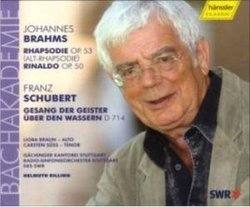| All Artists: Johannes Brahms, Franz [Vienna] Schubert, Helmuth Rilling, SWR Stuttgart Radio Symphony Orchestra, Carsten Süss Title: Helmuth Rilling conducts Brahms & Schubert Members Wishing: 0 Total Copies: 0 Label: Hanssler Classics Original Release Date: 1/1/2006 Re-Release Date: 11/14/2006 Album Type: Import Genre: Classical Styles: Opera & Classical Vocal, Symphonies Number of Discs: 1 SwapaCD Credits: 1 UPC: 4010276017967 |
Search - Johannes Brahms, Franz [Vienna] Schubert, Helmuth Rilling :: Helmuth Rilling conducts Brahms & Schubert
 | Johannes Brahms, Franz [Vienna] Schubert, Helmuth Rilling Helmuth Rilling conducts Brahms & Schubert Genre: Classical
German conductor Helmuth Rilling (b. 1933) has long been acknowledged as one of the world's experts on the music of J.S. Bach. He founded the Gächinger Kantorei in 1954 and gained an international reputation.... more » |
Larger Image |
CD Details
Synopsis
Album Description
German conductor Helmuth Rilling (b. 1933) has long been acknowledged as one of the world's experts on the music of J.S. Bach. He founded the Gächinger Kantorei in 1954 and gained an international reputation. Often referred to as "the master-singers of Stuttgart," the Gächinger Cantorei are distinguished from other choirs by requiring superior music training of all candidates for membership, and by suiting themselves to the requirements of the works to be performed, from twenty-four to over one hundred singers. Its members come from all over southwest Germany and the German-speaking regions of Switzerland. The choir has played a considerable part in the rediscovery and representation of the Romantic choral repertoire, especially works by Brahms and Mendelssohn. Since 1965 Helmuth Rilling has also been conductor of the Stuttgart Bach Collegium and has toured with both ensembles around the world. Maestro Rilling presents a program of sweeping German Romanticism inspired by the works of Goethe and represented by the immortal Alto Rhapsody of Brahms, Schubert's Gesang der Geister über den Wassern, and an excerpt from the Brahms rarity Rinaldo. Rilling and his Gächinger Kantorei Stuttgart are joined by the world-class talents of alto Lioba Braun and tenor Carsten Süss in performances that unquestionably establish Rilling as the preeminent interpreter of the Germanic choral tradition. This program is further evidence of the continuing vitality of Helmuth Rilling's musical concept as well as the relevance of Goethe for the twenty-first century. Destined to become one of the great choral discs of the decade, this album will be a most valuable addition to any choral music collection. Towards the end of the 1860s, Brahms was lodging with the Schumann family and began to realize a growing affection for Clara's daughter, Julie. On subsequently being told by Clara that Julie was engaged to be married to an Italian count, Brahms's reaction was to turn to composition as a solace and to set a piece for contralto, his favorite voice. The result was the Alto Rhapsody, two anguished verses of Goethe set to music of intense yearning. Written in 1820, Gesang der Geister über den Wassern (Song of the Spirits Above the Waters) is one of Schubert's most complex choral works, a virtuoso setting of a poem by Goethe for eight-part men's chorus and low strings. The poem is part Romantic mysticism and part dramatic description of nature, with waterfalls gushing forth from rocky crags and tumbling over stones & boulders until the water gathers into a gentle stream flowing into the glassy sea. The cantata Rinaldo is among the largest of Brahms's works for vocal and orchestral forces. Indeed, only Ein deutsches Requiem surpasses it in length and breadth, and yet it is almost never heard today. Completed in 1868, Rinaldo is again a setting of Goethe, with a theme taken from the time of the Crusades. The closing chorus, presented on this album, is its most famous highlight. The Viennese premiere of Rinaldo on February 28, 1869, with the composer conducting, was a success. Not every listener, however, was enthusiastic. Reviewing an 1833 performance, Eduard Hanslick found Brahms's musical portrayal of the title character devoid of passion. Nor has posterity been kind to Rinaldo: it has been shunted to the periphery of the Brahms canon. In part, the work's inability to obtain a stronghold in the repertory can be ascribed to the vagaries of reception history.
Similar CDs
| Ninsk Letters & Signs Genre: Jazz | |

 Track Listings (4) - Disc #1
Track Listings (4) - Disc #1